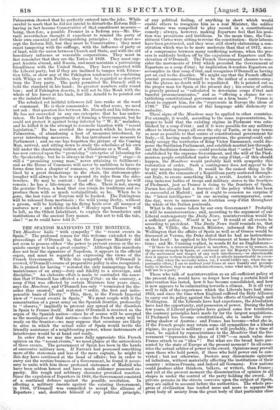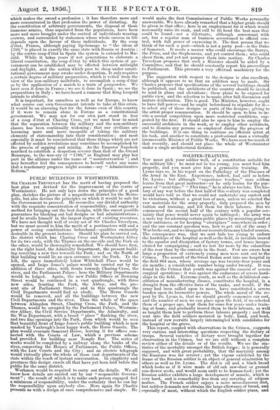THE SPANISH MANIFESTO IN THE MONITEUR.
Tire Moniteur hails "with sympathy" the "recent events in Spain." The professed reason for this welcome extended to the proceedings of O'Donnell is that the Espartero Ministry did not seem to possess either "the power to prevent excess or, the re- quisite energy to lead a great country." Although this manifesto does not bear the signature of Napoleon, it appears in the official organ, and must be regarded as expressing the views of the French Government. While this sympathy with O'Donnell is avowed, O'Donnell's course of preparative policy is also recognized. He is praised for having "restored the only mainsprings for the maintenance of an army—duty and fidelity to a sovereign, and discipline." An elaborate effort is made to contradict the asser- tion that O'Donnell has effected a coup d'etat : on the contrary, a coup d'etat was effected by certain Ministers four years since, says the Moniteur, and O'Donnell has only "terminated the dis- order thus created," and restored "order, the first and indis- pensable basis of liberty." This, then, is the French Imperial view of "recent events in Spain." We must couple with it the concentration of a great army on the Spanish frontier, professedly to "observe," impliedly to prevent any spread of the disorders in Spain to France itself'. But since O'Donnell is received as the organ of the Spanish nation—since he of course will be accepted as the mouthpiece of that nation—since the French army will be ready on the frontier—we may suppose that occasions are likely to arise in which the actual ruler of Spain would invite the friendly assistance of a neighbouring power, whose instruments of interference would be at hand and ready. In order that we may the more fully appreciate this French opinion on the "recent events," we must glance at the antecedents of those events. The government of Spam has been in the hands of successive military men. If Narvaez had possessed something more of the statesman and less of the mere captain, he might to this day have continued at the head of affairs; but in order to carry out the routine business of a Government, he found it neces- sary to unite with him those professed statesmen of Madrid who have been seldom honest and have much seldomer possessed ca- pacity. His rough and arbitrary character provoked reaction. Since the expulsion of Espartero in 1848, the Government consisted, of a continual defence against the possible revolution. In effecting a military emeute against the existing Government, in 1854, O'Donnell was compelled to accept the alliance of Espartero ; and, destitute himself of any political principle, of any political feeling, of anything in short which would enable others to recognize him as a real Minister, the soldier of fortune was compelled to play second in a constitutional comedy ; always, however, making Espartero feel that his posi- tion was precarious and invidious. In the mean time the Con- stitu.ent Cortes were sitting to revise the constitution: their labours have been protracted, and they were still slowly elaborating a con- stitution which was to be more moderate than that of 1812, more of a compromise between many conflicting notions, when the pro- cess is suddenly broken off by the expulsion of Espartero and the elevation of O'Donnell. The French Government chooses to con- sider the movements of 1852 which preceded the Government of Espartero as a coup d'etat ; by implication it renders Espartero an accomplice in that coup d'etat, and recognizes O'Donnell as having put an end to the disorder. We might say that the French official journal pronounces O'Donnell to be the author of a conte-coup ; but the phrase no doubt will be repudiated. He is pointed out as the proper man for Spain at the present day ; his course of action is gravely praised as "calculated to determine coups d'etat and baneful pronunciamientos," and as "offering a chance for es- tablishing constitutional government on a firm basis." France is about to support him, for she "represents in Europe the ideas of 1789." The equivocation of this language adds dishonesty to audacity. These signs of the Moniteur may be applied to other countries. For example, it would, according to the same representations, be proper to hold that the existing regime in Piedmont was esta- blished by a coup d'etat ; and if it were possible for any military officer to station troops all over the city of Turin, or in any towns as near as possible to that centre of constitutional government for Italy,—if, having made these preparations, the general could sud- denly occupy the territories of King Victor Emmanuel, could dis- perse the Sardinian Parliament, and establish martial law through- out the Sardinian domains—could proclaim that " order " had been established by the supreme Government, and the will of the Pied- montese people established under the coup d'état,—if this should happen, the Moniteur would probably hail with sympathy this restoration of order. Such a contingency does not appear to be by any means impossible. It would be the easiest thing in the world, with the remnants of a Republican party scatteredthrough- out Italy, to create something like a revolt. Austria is advan- cing immense bodies of troops and military stores to the frontiers of Piedmont, just as France is doing to the frontiers of Spain. Parma has already had a foretaste of the policy which has been so successful at Madrid ; and it ought to occasion no surprise if the "latest intelligence" in our morning contemporaries, some fine day, were to announce an Austrian coup d'etat throughout the whole of the Italian peninsula. What is the course taken by our own Government ? Probably it will be nonintervention ; and, according to the argument of our Liberal contemporary the Daily News, nonintervention would be a sufficient policy. Would it be so ? It would at all events be according to precedent. The Daily News itself reminds us that when H. Villele, the French Minister, informed the Mike of Wellington that the affairs of Spain as well as of Greece would be discussed at Verona, the Duke stated that he had no instructions on that head : he applied to his Government at home for instruc- tions; and Mr. Canning replied, in words fit for an Englishman— "If there be a determined project to interfere, by force or by menace, in the present struggle in Spain, so convinced are his Majesty's Government of the uselessness and danger of any such interference,—so objectionable does it appear to them in principle, as well as utterly impracticable in execu- tion,—that when the necessity arises, (or, I would rather say, when the op- portunity offers,) I am to instruct your Grace at once frankly and peremp- torily to declare that to any such interference, come what may, his Majesty will not be a party."
Those who talk of nonintervention as an all-sufficient policy at the present day, would have us forget how long a certain kind of intervention has lasted, how it has become consolidated, and how it now appears to be culminating towards a climax. It is all very well to talk of the experience which the Liberals have had since 1823, and since the time when England suffered the Holy Alliance to carry out its policy against the feeble efforts of Castlereagh and Wellington. If the Liberals have had experience, the Absolutists have had the opportunity, and possession of power. During the last few years if Liberal principles have gained some few territories the contrary principles have made by far the largest acquisitions. If Piedmont has become constitutional, she is under the over- awing shadow of Austria; and France has become—what she is. If the French people may retain some old sympathies for a liberal regime, its genius is military ; and it will probably, for a time at least, be cajoled by representations in the Moniteur that the Go- vernment "represents the ideas of 1789 "—so much value does France attach to an " idea" ! But what are the broad facts pre- sented by the state of Europe at the present moment ? In all coun- tries the actual arbiter of power is the sword. Opinions may prevail upon those who hold power, if those who hold power can be con- verted; but not otherwise. Doctors may disseminate opinions ad infinitum, without materially affecting the institutions of their country : witness Prussia and indeed all Germany. Few nations
could produce abler thinkers, talkers, or writers, than France ; and yet at the present moment the dissemination of opinion in all shapes is under the control of the party holding the sword. If private persons in the streets converse upon the subject of Spain, they are called to account before the authorities. The whole pro- gress of civilization has tended more and more to separate the great body of society from the great body of that particular class
which makes the sword a profession ; it has therefore more and more concentrated in that profession the power of dictating. By the constitution of arbitrary governments, the disposal of those immense armies, thus separated from the population, have been more and more broight under the control of individuals wearing crowns, and surrounded by statesmen whose whole success in life depends upon the favour of those individuals. By the coup d'etat, Franca, although paying lip-homage to "the ideas of 1789," is placed in exactly the same state with Russia or Austria ; by the centre coup d'etet in Spain the system is extended to Ma- drid. While it takes years if -not generations to elaborate a liberal constitution, the coup d'etat by which this system of go- vernment can be established may be effected between midnight and daylight, and the nation which goes to sleep under consti- tutional government may awake under despotism. It onlyrequires a certain degree of military preparation, which is veiled from the view of the non-military multitude, to accomplish a coup &Stet as by the application of a match to a train of gunpowder. We have seen it done in France ; we see it done in Spain ; we see the preparations in Italy ; we have heard a rumour that King Leopold intends to abdicate.
It is important, for ourselves as well as for Europe, to know what course our own Government intends to take at this crisis. It would be an alarming fact for the future even of this country if it were to remain alone in Europe as a constitutional government. We may not for our own part stand in fear of a coup d'etat at Charing Cross, yet we must bear in mind that the separation between the military and the non-military classes has been continually widening ; that our civilians are becoming more and more incapable of taking the military elements of statesmanship into their consideration ; and most especially it must be remembered that those things which are not effected by sudden revolutions may sometimes be accomplished by the process of salving and mining. As the Emperor Napoleon marched to establish a despotism severer than that of the Grand lionarque to the war-cry of "1789," so England may play her part in the alliance under the name of " nonintervention " ; and may hereafter feel the consequences to herself under any name that a reactionary progress might assume—say "Administrative Reform."



































 Previous page
Previous page